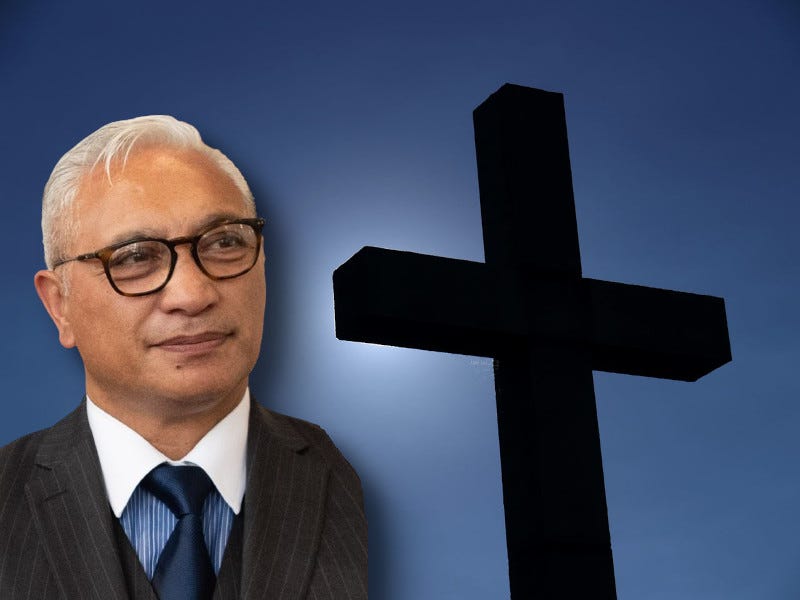The Christian Nationalism of Alfred Ngaro and NewZeal
There is more to the ideology of Ngaro's party than just Christian values
In June 2023, Pastor Peter Morlock of the City Impact Church, an evangelical congregation, held a ‘Christian Summit on the state of the nation’ to bring together the various Christian political parties (as well as a handful of current and former National Party MPs). Brian and Hannah Tamaki, the leaders of Destiny Church and its political wing Vision New Zealand attended; as did Leighton Baker, the former leader of the New Conservatives who now leads his own “Leighton Baker Party”; the current New Conservative leader Helen Houghton; and the leaders of the overtly Christian ONE Party.
Following the summit, the ONE Party rebranded as NewZeal, with a new leader- former National Party MP (2011-2020) Alfred Ngaro. Ngaro had attended the City Impact summit, but had raised the possibility of leading a new Christian party as early as 2019. Speaking with John Cowan on Newstalk ZB following the announcement of the new party, Ngaro talked about how he believes the values of the National Party have moved away from the values he holds. He cites the ban on conversion therapy and “non-binary gender identity that came through the department of internal affairs” as examples, labelling himself a centrist conservative.
“I want to be really clear, this is a political party, right? It’s like anyone, if you own a business, right? And you’re a Christian, it doesn’t make your business a Christian business, it makes it a business that’s run by someone that has a certain set of values, it’s a business that you’d want all people to come. This political party is not just for Christians, I’m a Christian [with] my values that I have, but it’s a party for all New Zealanders, and I’ve always said that and that’s really important”
This is a common way for Christian politicians to speak to broad audiences in this largely secular country, highlighting the importance of their faith, but stressing their ability to govern on behalf of everyone. The way Ngaro speaks to audiences of evangelicals though makes for a stark contrast.
“I’ll tell you this: We need to be a nation of believers that aren’t afraid” he told the crowd assembled at the June Christian summit “are you willing to be broken and burnt? Because that’s the army that God is looking for.” He spoke about what is known as Seven Mountains Dominionism.
“You know we talk about seven mountains not as a theology, but as a strategy, but what are we doing there? How are we going to take those, right? It's time now to preach that the space between the temple and the palace is not meant to be a divide. When Solomon was rebuilding it, he was doing it because God said, the place of governance, that Temple, is the place of worship, they’re not not meant to be separated! So to the pastors and the Preachers and the theologians in our church, get your theology right!”
The audience applauded these remarks.
“You need to stand up in your places and your realms of influence and do what you need to do, [be the] voice of moral values and in our nation as well. That's what we need, that’s what our people need”
So what is seven mountains dominionism?

In August 1975, Loren Cunningham, the founder of Youth With a Mission, was staying at a cabin in the Rocky Mountains of Colorado. As Cunningham tells it, while there he received a message from God. A “list of things I had never thought about before.” Later that day, a local ranger notified Cunningham of a phone call waiting for him back at the ranger’s station. When he hiked to the station, he found the call was from Bill Bright, the founder of Campus Crusade for Christ, who was staying with his wife in nearby Boulder, inviting him to meet with them. The next day, Bright told Cunningham God had shown him a few things that day, in fact, the exact same message God had given to Cunningham. In their revelation, God had told both men that there were seven “spheres,” or mountains, that were the foundations of every society: religion, family, education, government, media, arts and entertainment, and business. Whoever could take those mountains could take a nation.
“God’s plan has always been for us to have kingdom dominion and rule over every part of the world, so that His kingdom might fully inhabit the earth” writes Tommi Femrite, founding ‘apostle’ of GateKeepers International and Apostolic Intercessors Network in Invading the Seven Mountains with Intercession: How to Reclaim Society Through Prayer. (2012) “Yet when we look at the various areas of American society today, we must ask ourselves, Who is ruling? Sadly, it’s not us.” Femrite uses similarly militant language to Ngaro in her book.
“As we encounter the enemies upon each of the Seven Mountains, we must remain in a posture of having our spiritual ears tuned into heaven’s channel. In Genesis 1:28, we see that the Lord has given us the “Seven Mountain Mandate” to take dominion; this is our authoritative order from God. Yet we must not only have strategy to follow through with this order, we must also recognize that our ultimate Commander is ready and willing to provide us with this strategy”
For adherents of Seven Mountains Dominionism, having dominion over religion, family, education and government is only half the picture, Christians must also have dominion over business, media, arts and entertainment- areas Femrite believes are currently controlled by Jews. “American Jews—numbering a mere 1.7 percent of the US population (5.2 million out of 304 million)—have ruled the mountains of arts and entertainment, business, and media., To this day, they continue to prove one of the fundamental truths of the Seven Mountains: it only takes one person to reach a mountain’s summit and claim it as his.” She places great emphasis on the importance of culture.
“Christians have been working in Hollywood for decades trying to make a difference. I believe it has taken this long for those believers not on the Arts and Entertainment Mountain to wake up and realize the significance of this cultural sphere. Culture is not only reflected by its arts and entertainment, it is shaped by them”
This way of thinking is not dissimilar to the Brietbart doctrine – the idea that politics is ‘downstream’ from culture, and therefore you can influence politics by first changing culture. This was of course the strategy of Breitbart News under the leadership of Steve Bannon (later an adviser to Donald Trump), and is the strategy of Voices for Freedom and their online radio network, Reality Check Radio.
Voices for Freedom and Reality Check Radio have emerged from the secular wing of the anti-government movement that grew out of the COVID-19 pandemic, and represent the beginnings of an infrastructure that can exist to influence culture and politics. The religious wing of the movement largely emerged from Pentecostal Christians who believed the government was overstepping its authority by obstructing their right to worship (though vaccine mandates and limitations on gathering sizes). That wing already has an infrastructure in place, incorporating churches, publications, and even a homeschooling curriculum. Christian Nationalism- the belief that New Zealand should be Christian nation- has the potential to become the dominant strain of the anti-government movement in the future.
“Jesus Christ is now being challenged: you could no longer hide [your faith] as a nice thing to have. Everywhere you are now it's being challenged, and what is God wanting? He's wanting to Wake. Us. Up.“ Ngaro told worshipers at the Elim Christian Centre in Porirua in March of 2023.
“Our God is about to move in a way in our nation that we've never seen before, and so he's now calling, he's stirring us up, in our hearts and in our lives so that we will be ready and present for him to do what he's calling us to do…How it starts, Lord- here we go Lord you have governance. In other words you have control of my heart, you see when he has control over your heart then here's what happens then he allows for you to have peace in your home, and when you've got peace in your home, here's what happens, then you can have healing in your nation and in your community. But you have to surrender first to him, you have to surrender first to him, you have to contend.”
Will Ngaro’s NewZeal achieve anything? Probably not this election. While they excitedly shared a poll that put them on 1%, this would be three times the vote that ONE got in 2020, and still well short of the threshold to make it into parliament. Ngaro is optimistic though. “Over a million people actually identified as being Christian, there's a lot of votes in there,” he told Pacific Mornings. Most of those million are not Christian Nationalists, and Seven Mountains Dominionism is a fringe idea even among evangelicals. But Ngaro doesn’t need a million votes, he needs about 150,000. If the other Christian Parties were either out of the picture or in some sort of alliance with NewZeal, then a Christian Nationalist party being elected to parliament in the future is not entirely outside the realm of possibility, but we’re unlikely to see it come to pass in the next few weeks.



